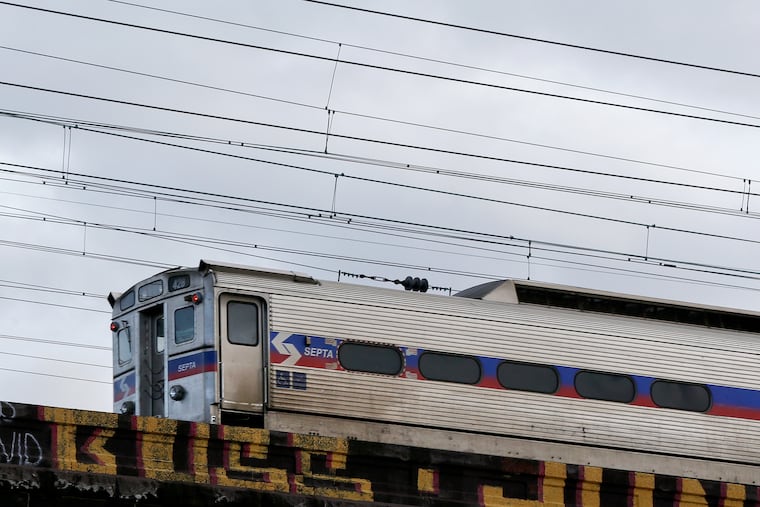Penn Medicine, Drexel and Wawa will provide free SEPTA passes to employees
SEPTA is looking for ways to rebuild ridership from the steep pandemic plunge.

Penn Medicine, Drexel University, and Wawa soon will offer free SEPTA monthly passes to thousands of their employees for travel on any of the public transit system’s services in an initiative to increase ridership, officials said Monday.
The move comes as system ridership remains far below what it was before the coronavirus pandemic upended daily life in March 2020. Fare revenue has plummeted and, like many transit agencies around the country, SEPTA has relied on federal emergency aid to maintain operations.
There are a few signs that recent spikes in the price of gasoline — $4.32 on average Monday in the Philadelphia region — could be nudging some riders back to buses and trains, but it’s too early to tell for certain.
In a longer play to win back riders, Penn Medicine, Drexel, and Wawa have agreed to pay $140 each for six months’ worth of passes for about 15,600 eligible workers, SEPTA officials said. The six-month demonstration project begins May 1, with a plan to make the arrangement permanent and expand it to other employers if it’s successful.
An “Anywhere” pass that gives access to all transit services plus regional rail normally costs individual riders $204 a month.
The program will be known as SEPTA Key Advantage. People who want to use the benefit can get a Key card loaded by their employer or have the cash balance loaded onto an already active card.
“We believe that this product is going to allow us to grow transit usage as a habit again,” Erik Johanson, director of operating budgets for SEPTA, said. “We’re putting passes in the hands of people who now have a financial incentive to use it,” considering the cost of fuel and the amount they’d otherwise spend on parking.
As of Feb. 28, SEPTA carried a weekday average of 507,000 passengers, or about 51% of the riders who used it at the same point in 2019.
These kinds of partnerships have been successful in other cities. Seattle’s transit system gets about 60% of its fare revenue from employers who subsidize their workers’ rides, Johanson said.
“Participating in this pilot program aligns with Drexel’s ongoing commitment to improving sustainability practices at the university and being part of the solution to climate change,” Drexel University president John Fry said in a statement.
Dave Simonetti, Wawa senior director of store operations, said: “We value the public transportation system and are proud to play a role in bolstering the recovery from the pandemic.”
SEPTA will get guaranteed fare revenue of about $2.1 million for six months, or about what it would realize from riders who work at the three employers and buy passes at full price, Johanson said. The hope is that workers will continue to use the transit system long after the pilot ends, General Manager Leslie S. Richards said.
“We will be reducing traffic congestion, alleviating demand for parking, and providing a powerful recruitment tool for businesses as they compete to hire and retain talent and as they figure out their return-to-office plans,” Richards said.
For the 2023 fiscal year, which begins July 1, SEPTA is budgeted to have service frequency at 96% of pre-COVID levels on transit services and 75% on Regional Rail, Johanson said. Customer surveys have found that frequency of service is a top priority for public transportation riders.
Penn Medicine plans to offer access to about 10,000 employees at all its facilities in Philadelphia, though interested employees at the health system’s other facilities also can participate in the program, a spokesperson said. Drexel University will make it available to about 3,800 workers, and Wawa will offer passes to 1,800 employees at city stores.
The project is “a creative, bold investment in building ridership and opportunity to get our city back on track,” said City Councilmember Helen Gym, who was involved in discussions on the project. “It’s good for workers, good for employers, and good for the environment.”
“Institutional pass programs are an important way the Philadelphia region can get more residents back to riding transit, and this is going to be a critical piece of [our] economic recovery as we emerge from COVID-19,” said Jon Geeting, a member of the executive committee of Transit Forward Philadelphia, a coalition of public transportation advocates.
SEPTA says sales of its weekly passes were up 14% in the first two weeks of March, which coincided with the surge in retail gasoline prices. But at the same time, the agency was offering 25% off the regular price, so it’s difficult to pinpoint what exactly was driving the increase. That promotion ends Tuesday night.
This story has been updated to reflect that Penn will offer access to the to workers at all of its facilities in the city.